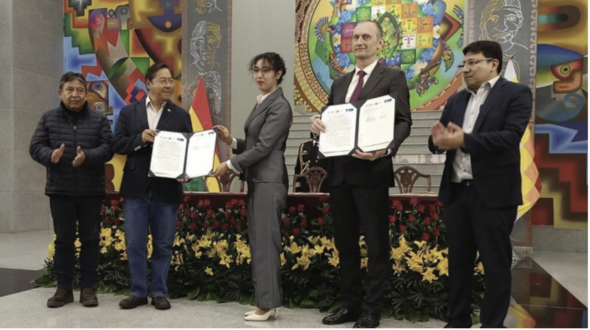The plant is scheduled to launch in the second half of 2025, with a planned capacity of up to 14,000 tons of lithium carbonate per year. Lithium carbonate is a raw material used to obtain lithium, which is used, among other things, in lithium batteries.
According to the the Rosatom media center website
In La Pas, Bolivia, in the presence of President of the Plurinational State of Bolivia Luis Arce, Uranium One Group JSC (an entity of the ROSATOM) and state Bolivian company YLB (Yacimientos de Litio Bolivianos) signed an agreement on the construction of a pilot installation for lithium carbonate production in the Uyuni Salt Pan in the Potosí Department.

The signing of the agreement indicates the interest of YLB in further expansion of cooperation in the lithium field with the Russian partner. The cooperation was launched in June this year by signing a framework agreement on the construction of a lithium carbonate mining and production complex on the basis of the Russian sorption extraction technology in another Bolivian salt pan, i.e. salar of Pastos Grandes in the Potosi Department.
During this period, a program of geophysical surveys of the salar has been implemented, and a preliminary feasibility study for the project has been developed. Under the scope of cooperation with Tomás Frías Autonomous University, the Russian sorption extraction technology passed laboratory testing, and the results thereof confirmed its high effectiveness in the brines of Bolivian salars.
The signed agreement on the construction of the pilot installation in the Salar de Uyuni also envisages that the Russian direct lithium sorption extraction technology will be applied. The Salar de Uyuni which is located at an elevation of 3,650 m above sea level, spreads at over 10,5 thousand square kilometers and is the world’s largest lithium salt pan. The Uyuni region is remarkable for its high level of industrial development, extensive road network, and energy security. The project suggested by the Russian company envisages that a pilot installation will be launched within two years with subsequent gradual production of up to 14 thousand tons of lithium carbonate per year.
This Agreement signed by ROSATOM in the lithium field abroad is another step for Russia to strengthen and build up its ties with friendly states, which in turn are interested in developing trade and industrial relations with our country.
 Ọmọ Oòduà Naija Gist | News From Nigeria | Entertainment gist Nigeria|Networking|News.. Visit for Nigeria breaking news , Nigerian Movies , Naija music , Jobs In Nigeria , Naija News , Nollywood, Gist and more
Ọmọ Oòduà Naija Gist | News From Nigeria | Entertainment gist Nigeria|Networking|News.. Visit for Nigeria breaking news , Nigerian Movies , Naija music , Jobs In Nigeria , Naija News , Nollywood, Gist and more









